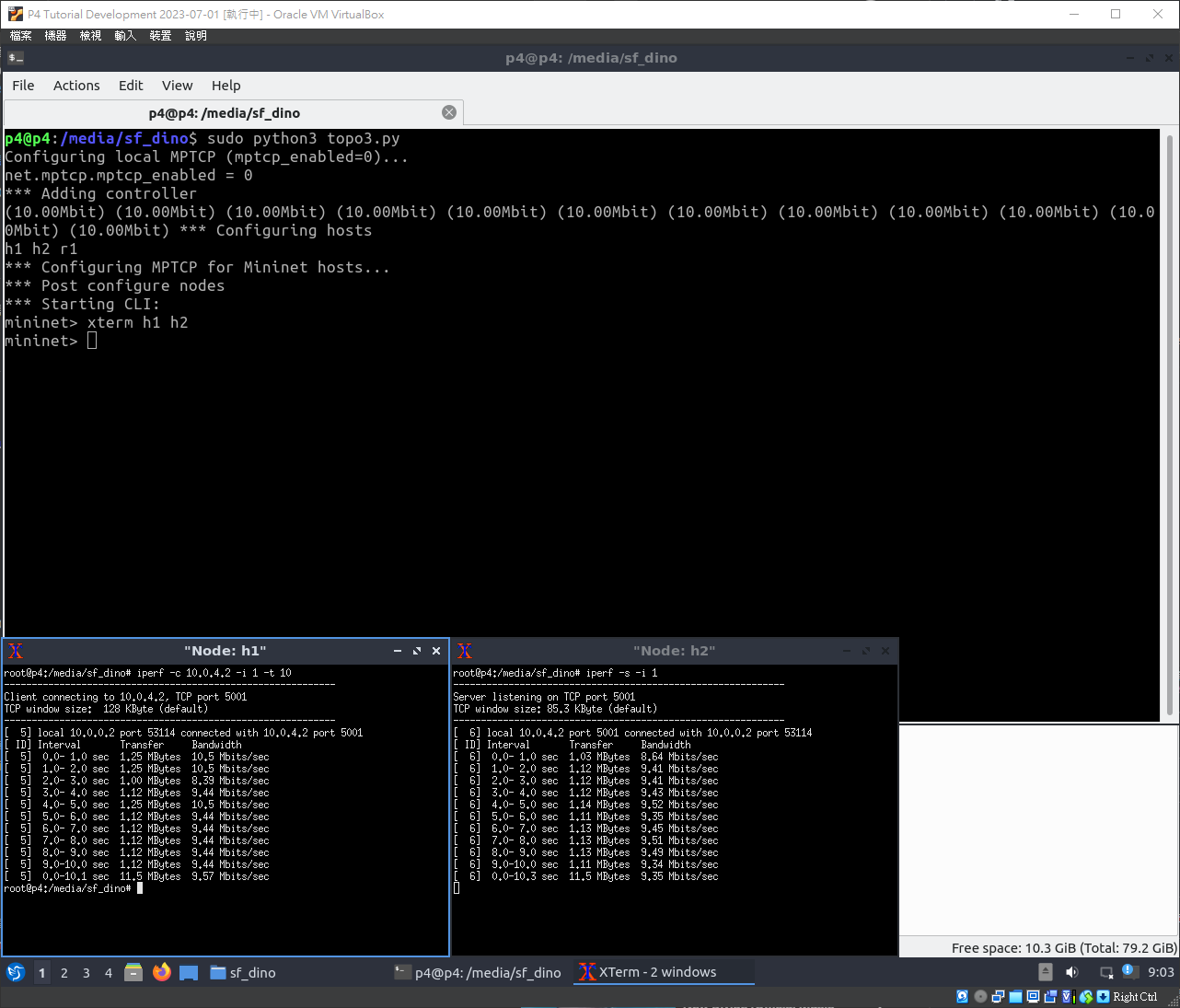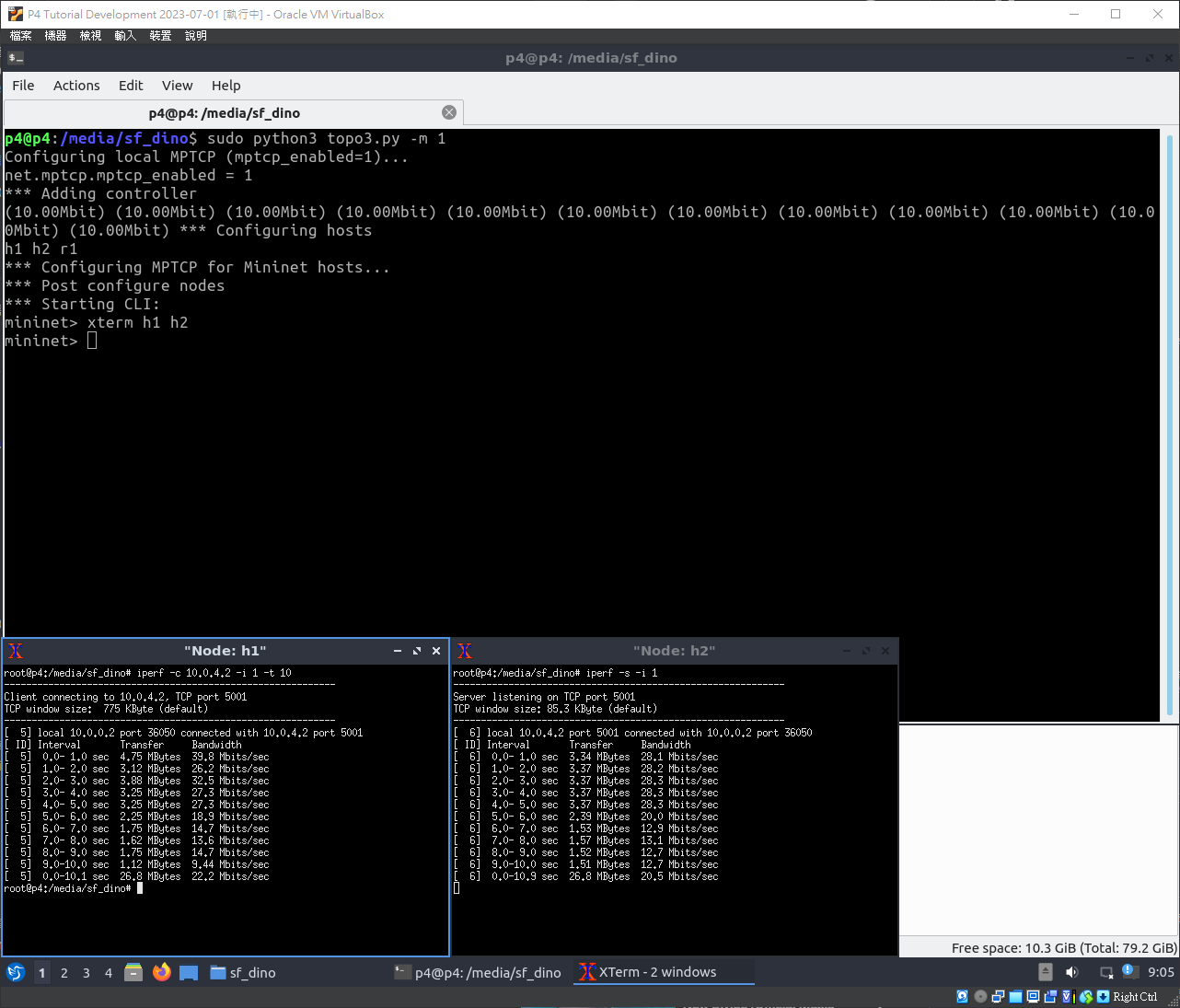MPTCP - Experiment Record
1. Experiment Name
MPTCP Three-Path Experiment
2. Experiment Objective
Using MPTCP to create a topology with three connections between two hosts over a single route.
3. Experiment Methodology
Create topology using a script

1 2 3 4 5 6 7 8 9 10 11 12 13 14 15 16 17 18 19 20 21 22 23 24 25 26 27 28 29 30 31 32 33 34 35 36 37 38 39 40 41 42 43 44 45 46 47 48 49 50 51 52 53 54 55 56 57 58 59 60 61 62 63 64 65 66 67 68 69 70 71 72 73 74 75 76 77 78 79 80 81 82 83 84 85 86 87 88 89 90 91 92 93 94 95 96 97 98 99 100 101 102 103 104 105 106 107 108 109 110 111 112 113 114 115 116 117 118 119 120 121 122 123 124 125 126 127 128 129 130 131 132 133 134 135 136 137 138 139#!/usr/bin/python import argparse from mininet.net import Mininet from mininet.node import RemoteController, OVSKernelSwitch, Host from mininet.cli import CLI from mininet.link import TCLink, Intf from mininet.log import setLogLevel, info from subprocess import call, check_call def configure_local_mptcp(enable_mptcp): """ Configure MPTCP on the local machine. :param enable_mptcp: True to enable MPTCP, False to skip. """ if enable_mptcp: try: info("Configuring local MPTCP (mptcp_enabled=1)...\n") check_call(["sudo", "sysctl", "net.mptcp.mptcp_enabled=1"]) except Exception as e: info(f"Failed to configure local MPTCP: {e}\n") else: try: info("Configuring local MPTCP (mptcp_enabled=0)...\n") check_call(["sudo", "sysctl", "net.mptcp.mptcp_enabled=0"]) except Exception as e: info(f"Failed to configure local MPTCP: {e}\n") def myNetwork(enable_mptcp): # Configure MPTCP on the local machine if enabled configure_local_mptcp(enable_mptcp) # Create Mininet net = Mininet(topo=None, build=False, ipBase='10.0.0.0/8') info('*** Adding controller\n') # Add hosts and router h1 = net.addHost('h1') h2 = net.addHost('h2') r1 = net.addHost('r1') # Set bandwidth to 10Mbps linkopt = {'bw': 10} # Add multiple links between h1, h2, and r1 net.addLink(r1, h1, cls=TCLink, **linkopt) net.addLink(r1, h1, cls=TCLink, **linkopt) net.addLink(r1, h1, cls=TCLink, **linkopt) net.addLink(r1, h2, cls=TCLink, **linkopt) net.addLink(r1, h2, cls=TCLink, **linkopt) net.addLink(r1, h2, cls=TCLink, **linkopt) net.build() # Set all interfaces' IPs to 0 in preparation for manual IP allocation r1.cmd("ifconfig r1-eth0 0") r1.cmd("ifconfig r1-eth1 0") r1.cmd("ifconfig r1-eth2 0") r1.cmd("ifconfig r1-eth3 0") r1.cmd("ifconfig r1-eth4 0") r1.cmd("ifconfig r1-eth5 0") h1.cmd("ifconfig h1-eth0 0") h1.cmd("ifconfig h1-eth1 0") h1.cmd("ifconfig h1-eth2 0") h2.cmd("ifconfig h2-eth0 0") h2.cmd("ifconfig h2-eth1 0") h2.cmd("ifconfig h2-eth2 0") # Enable IP forwarding to allow r1 to route packets r1.cmd("echo 1 > /proc/sys/net/ipv4/ip_forward") info('*** Configuring MPTCP for Mininet hosts...\n') if enable_mptcp: for host in [h1, h2]: host.cmd("sysctl -w net.mptcp.mptcp_enabled=1") host.cmd("sysctl -w net.mptcp.mptcp_debug=0") host.cmd("sysctl -w net.mptcp.mptcp_path_manager=fullmesh") else: for host in [h1, h2]: host.cmd("sysctl -w net.mptcp.mptcp_enabled=0") host.cmd("sysctl -w net.mptcp.mptcp_debug=0") # Assign IP addresses to r1, h1, and h2 r1.cmd("ifconfig r1-eth0 10.0.0.1 netmask 255.255.255.0") r1.cmd("ifconfig r1-eth1 10.0.1.1 netmask 255.255.255.0") r1.cmd("ifconfig r1-eth2 10.0.2.1 netmask 255.255.255.0") r1.cmd("ifconfig r1-eth3 10.0.3.1 netmask 255.255.255.0") r1.cmd("ifconfig r1-eth4 10.0.4.1 netmask 255.255.255.0") r1.cmd("ifconfig r1-eth5 10.0.5.1 netmask 255.255.255.0") h1.cmd("ifconfig h1-eth0 10.0.0.2 netmask 255.255.255.0") h1.cmd("ifconfig h1-eth1 10.0.1.2 netmask 255.255.255.0") h1.cmd("ifconfig h1-eth2 10.0.2.2 netmask 255.255.255.0") h2.cmd("ifconfig h2-eth0 10.0.3.2 netmask 255.255.255.0") h2.cmd("ifconfig h2-eth1 10.0.4.2 netmask 255.255.255.0") h2.cmd("ifconfig h2-eth2 10.0.5.2 netmask 255.255.255.0") # Set up multi-path routing for h1 h1.cmd("ip rule add from 10.0.0.2 table 1") h1.cmd("ip rule add from 10.0.1.2 table 2") h1.cmd("ip rule add from 10.0.2.2 table 3") h1.cmd("ip route add 10.0.0.0/24 dev h1-eth0 scope link table 1") h1.cmd("ip route add 10.0.1.0/24 dev h1-eth1 scope link table 2") h1.cmd("ip route add 10.0.2.0/24 dev h1-eth2 scope link table 3") h1.cmd("ip route add default via 10.0.0.1 dev h1-eth0 table 1") h1.cmd("ip route add default via 10.0.1.1 dev h1-eth1 table 2") h1.cmd("ip route add default via 10.0.2.1 dev h1-eth2 table 3") h1.cmd("ip route add default scope global nexthop via 10.0.0.1 dev h1-eth0") # Set up multi-path routing for h2 h2.cmd("ip rule add from 10.0.3.2 table 1") h2.cmd("ip rule add from 10.0.4.2 table 2") h2.cmd("ip rule add from 10.0.5.2 table 3") h2.cmd("ip route add 10.0.3.0/24 dev h2-eth0 scope link table 1") h2.cmd("ip route add 10.0.4.0/24 dev h2-eth1 scope link table 2") h2.cmd("ip route add 10.0.5.0/24 dev h2-eth2 scope link table 3") h2.cmd("ip route add default via 10.0.3.1 dev h2-eth0 table 1") h2.cmd("ip route add default via 10.0.4.1 dev h2-eth1 table 2") h2.cmd("ip route add default via 10.0.5.1 dev h2-eth2 table 3") h2.cmd("ip route add default scope global nexthop via 10.0.3.1 dev h2-eth0") info('*** Post configure nodes\n') CLI(net) net.stop() if __name__ == '__main__': parser = argparse.ArgumentParser(description="Mininet MPTCP Setup Script") parser.add_argument('-m', '--mptcp', action='store', default='0', choices=['0', '1'], help="Enable MPTCP if set to 1. Default is 0 (disabled).") args = parser.parse_args() setLogLevel('info') myNetwork(enable_mptcp=(args.mptcp == '1'))Conduct the experiment
4. Results and Analysis
Without MPTCP

With MPTCP

5. Conclusion
6. References
| |
